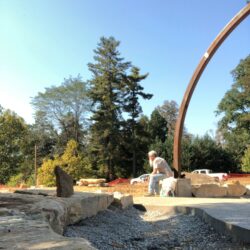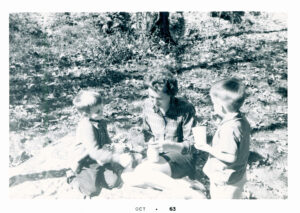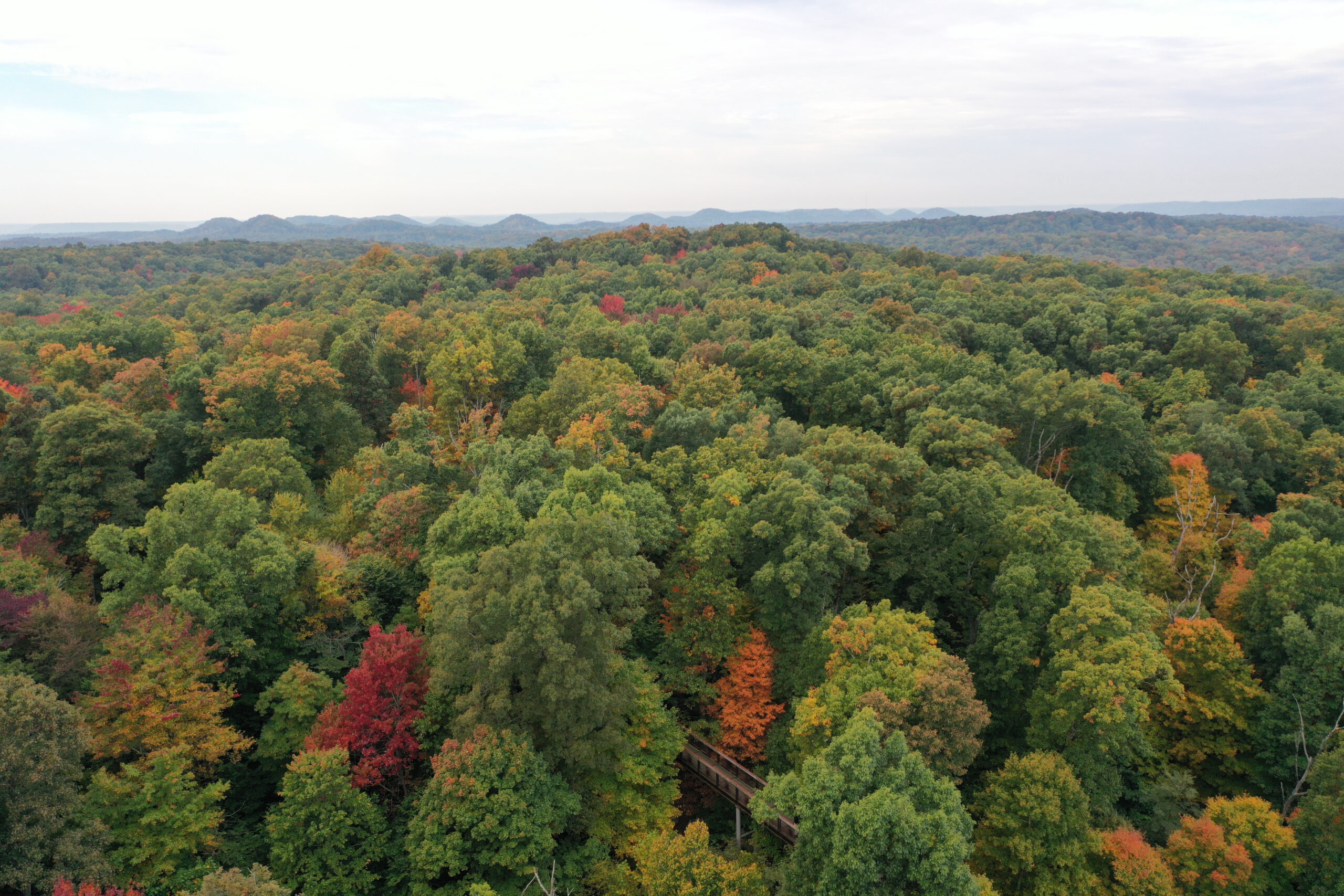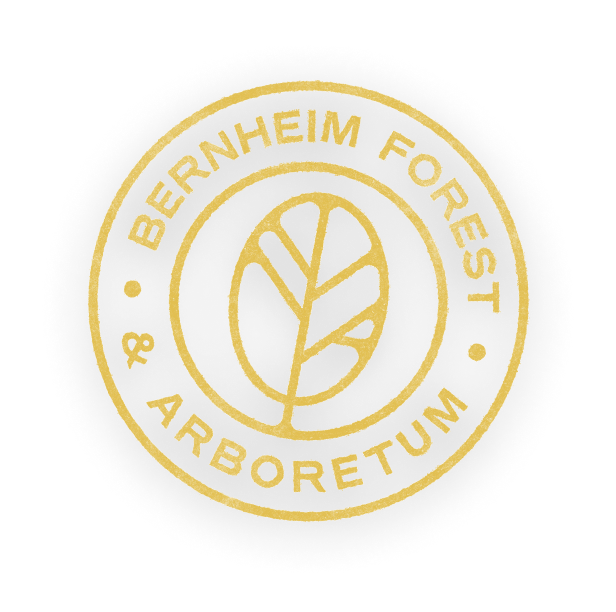Visitors to Bernheim get to experience many wonders, from trails through its vast forest to the Edible Garden and, of course, the Forest Giants in a Giant Forest. But not many visitors get to have personal encounters with our staff to learn their stories. This casual chat with Facilitator of Outreach and Regenerative Design Claude Stephens is the latest in a series of conversations between Education Director Kristin Faurest and other members of Bernheim’s staff.
 What did nature look like to you as a kid?
What did nature look like to you as a kid?
I grew up in Jeffersontown, right when it was developing. The Bluegrass Industrial Park was a big area of farmland. So, nature to me was more just being out in a suburban area with all kinds of little pockets of woods and streams, and several hundred acres being turned into an industrial park with these huge yellow pieces of machinery. My grandfather purchased land in Jefferson County on Route Road, about 20 acres of all-wooded area with a stream cutting through it and we developed a campsite out there. Even when I was young, 11 or 12, we could ride our bikes out there with knapsacks full of peanut butter and jelly sandwiches and stay out the whole weekend without adult supervision. We would hang out there, my pals and my brother, a gang of six or seven of us that would hang out in the woods for a long stretch of my life until we went away to college.
Can you still go there?
Our family doesn’t own it anymore because all around it developed and it was no longer a place of refuge. It got to be a place that felt weird because what used to be the woods was now developing as a rural subdivision. It changed from an agricultural rural landscape.
But the other aspect is our family constantly went on trips to natural places. Red River Gorge, all the state parks. Over the years, a cluster of my parents’ friends and their kids would go to state parks. I grew up with a group of non-related friends, but we were constantly going to natural places. We would rotate and pick a place to go each year on a big vacation – Mexico City, Grand Canyon, Outer Banks.
How did this relationship with nature shape who you are now — for example, how is your childhood experience with nature part of your creation of Playcosystem?
I became comfortable in the woods – the level of comfort that if I were lost in the woods for 2-3 days, I wouldn’t panic. I always had this connection to rocks and plants and water and trees and the way all that fits together – that was just part of the language of my life.

What was your first experience with Bernheim?
I have no recollection of because I was too young – for my parents, Bernheim was a favorite place. My dad especially developed a relationship with Bernheim. He sold office supplies to Isaac W. Bernheim foundation.
How did your career path begin?
If you’d asked me in high school, I would have said a forest ranger. I didn’t really know what forest rangers did. I studied biology at Centre College with an emphasis on systems biology. Evolutionary ecology was a new thing. Biology was metastasizing into sub sciences.
Eventually I got a job as Director of Education at the Tallahassee Museum of History and Natural Science, which took me to Tallahassee, Florida, for 12 years. When I was first there, I lived in an abandoned treehouse in an old hippie community. From there, I went to New Orleans and worked for two years at Historic Houses in the French Quarter. My father, who had kept in contact with Bernheim — he actually wrote their first newsletter, done on a mimeograph machine — let me know about a job opening for the Director of Education. This was in 1999. Back then, it was that curriculum-driven, standards-defined, public education dominant focus on a set of facts children need to know in order to effectively move through the system.
You have a curious job title (Facilitator of Outreach and Regenerative Design). How did you arrive at it?
The facilitator part of it is that I wanted to do things that I didn’t really know how to do, and I’m still doing that. A lot of our work is pushing boundaries. I figured if I want to be a director, I have to know what I’m doing. If I want to do things where I don’t know what I’m doing I thought facilitator would be a better word.
 What’s the world you want to work for – and how is play a tool for that?
What’s the world you want to work for – and how is play a tool for that?
Part of it is to tear down some structural issues that I don’t agree with. I have some philosophical mentors – through readings – who are shifting big systems. I’m interested in how they approach the shift of big systems. Wes Jackson is a plant geneticist who’s trying to shift agriculture. That’s a 12,000-year-old system. Wes Jackson, Wendell Berry – they call agriculture the 10,000-year-old mistake. It shifted the way we use planetary resources. Wes Jackson is trying to shift it from annuals grown in monoculture to perennials grown in polyculture.
That’s why I got into play; I think the modern education system is an artifact of the industrial age. I kept asking myself, what’s the best thing I can do as an individual for kids who come to Bernheim? My favorite field trips were always the ones where there was the least control over me.
You collaborate a lot with other organizations in Louisville, and you have a relationship with this city that goes back a long way. What are the systemic barriers you’re working against?
Racism. Disproportionate access to resources – to nature. We used to think of Bernheim as an island. We know now that the future of organizations was this connectedness with others. Who are the others you need to connect with? If you really stretch actions beyond our borders, there are no borders. That’s when I stopped thinking of Bernheim as a place and started to think of it as a way to connect with people.
I’m seventh generation Louisville. I see the relationships that exist and the structural patterns. It helped being an evolutionary ecologist because if you boil that down, all you are doing is looking at patterns. Trying to translate patterns into an opportunity to either accept the pattern or break the pattern. Sometimes that literally means breaking it.

